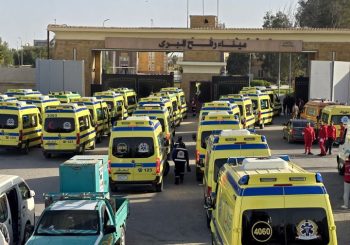The American University in Cairo hosted its first “disability conference” on Wednesday to create an inclusive society for those with disabilities by shifting focus to removing barriers in education settings and promoting effective communication to raise awareness about the needs of the disabled.
Hosted by the university’s Office of Student Support, the conference attendees included representatives from the National Council of Disability Affairs (NCDA) and the Egyptian parliament, as well as academics, university professors and nongovernmental organizations whose work revolves around Egypt’s disabled community.
The conference comprised several different panels tackling issues such as autism with guest speakers, including Dr. Heba Hagrass, an Egyptian Member of Parliament and a board member at the National Council for Disability Affairs, to discuss each topic.
“We want to bring in a positive change in educational institutions and cultivate the sense of responsibility towards creating a supportive environment for students with disabilities,” said Dr. Ola Morsy, Director of the Office of Student Support. “This will hopefully help students overcome challenges faced in society, including educational challenges. Students with special abilities have the right to take full opportunity of the best student life experience possible.”
AUC’s Vice President for Student Affairs, Dr. Khaled Dahawy, also emphasized the importance of enhancing the inclusion of students in the community by implementing effective techniques.
“The AUC is extremely keen to conduct this conference out of its strong determination to tackle the different forms of accommodation and accessibility,” Dahawy said. “By raising awareness, this will create a positive impact on the future generations, leveraging AUC’s resources and expertise.”
The university provides an array of services to students with physical and learning disabilities to increase the inclusivity of the community: All areas of the campus are wheelchair accessible, while club cars are available for transport around campus. The university also offers technologies and software for individuals with visual impairments and provide “special academic accommodation” to individuals with learning disabilities.
According to statistics from the World Health Organization, citizens with special needs and disabilities comprise 10 percent of Egypt’s overall population.
However, they continue to be marginalized from the society and often lack access to basic services, in addition to facing cultural stigmatization, causing many to fear seeking out assistance in order to avoid the “shame” attached to disability.







Comments (0)